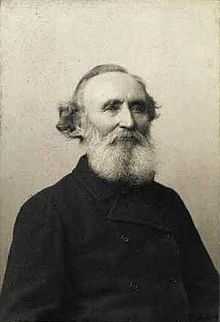Morten Eskesen
Morten Eskesen (January 5, 1826 - February 8, 1913) Eskesen was born in Ulbæk in Lyne Parish between Skjern and Varde, where the parents were farm owners. From the time he was 14 until he was 20, he worked in the summer at the farm while he was in the winter house and assistant teacher. He was teaching diploma from Snedsted College in 1848. In the years he was a teacher in Jutland and then tutor and high school teacher in different parts of the country. From 1858 - 1884 he was independent school leader on Funen, first in Rudme and then in Odense . In 1874 he published a widely used Songbook "Nordic Tracks for use in the People's Meetings, rifle and Schools total of Morten Eskesen" and in 1890 a collection of 80 songs to own melodies. From 1869 to 1876 he edited the weekly Fylla, dealing with matters of free and high schools. During the life he collected also folk songs, which he learned from various informants. In 1907 he recorded the some of these songs on fonografvalser . He was also deeply committed to the future of public and political sentiments and participated in numerous meetings at schools and other places. Finally, he published a number of books with memories of his long life.
Grundtvig's Influence
Morten Eskesen was introduced to the ideas of N. F. S. Grundtvig during childhood. This influence manifested in later life as staunch nationalism, for which Eskesen was considered in some circles a fanatic. Grundtvig was the person who sent Eskesen to teach at the university in Marielyst, which was later renamed Grundtvig University.[1]


See also
References
- ↑ "Eskesen, Morten, 1826-1913, Danish free school man". Retrieved 2 August 2013.
References
- This article was initially translated from the Danish Wikipedia.
|